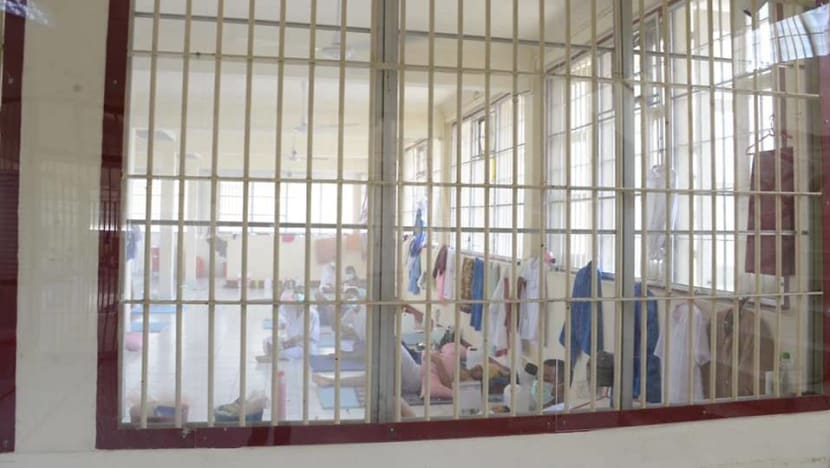COVID-19: Provisional release on the cards for some inmates in Thailand amid overcrowding

Inmates are treated for COVID-19 at the Medical Correctional Hospital on May 8, 2021. (Photo: Department of Corrections, Thailand)
BANGKOK: Some inmates in Thailand could soon get a provisional release as the government plans to reduce overcrowding in prisons in its fight against COVID-19.
A new wave of outbreak is sweeping through detention facilities nationwide. More than 100,000 people have been infected in Thailand since April, including some 18,000 prisoners.
The transmission of the virus among inmates has raised concerns over prison capacity. Data from the Corrections Department showed more than 311,000 inmates are incarcerated in 143 correctional facilities nationwide.
Justice Minister Somsak Thepsutin has admitted that the inmate population is well over the capacity of what the prisons were designed for and has proposed a plan to resize it. The plan is currently being developed by the parole committee.
“Once released, they have to complete the quarantine period. The same standard of practice is applied. We won’t let out infected patients,” Mr Somsak told local media on Monday (May 24).
“They have to get tested in the hospital upon their release. This is a mutual responsibility. For us to bail anyone or do anything, it has to be done properly. We can’t allow them to spread infections.”
However, there have been cases when former inmates tested positive for COVID-19 shortly after their release. Among them is political activist Panusaya Sithijirawattanakul, who was detained at the Central Women Correctional Institution for nearly two months over a royal defamation charge.
She was released on bail on May 6 and found to be positive for the coronavirus after a swab test on May 10. Her family members have also been infected.
READ: Thailand to tighten border controls after detecting B1351 COVID-19 variant from South Africa
CAPACITY ISSUES UNDER THE SPOTLIGHT
The COVID-19 situation in prisons sparked public interest after several political activists tested positive for the virus either during or shortly after their pre-trial detention. Besides Panusaya, the others include civil rights lawyer Arnon Nampa and university student Panupong Jadnok, who both face royal defamation charges for their roles in a pro-reform movement.
The Corrections Department first publicly reported COVID-19 infections in its facilities on May 12. It said in a statement that various “proactive measures” have been implemented to control the spread of the virus in its facilities, such as a 21-day quarantine and two COVID-19 tests required for new inmates.
“The Department of Corrections would like to confirm it can control the situation and that every prison has strict measures,” the statement said then.
Last week, Thailand saw thousands of new cases being recorded every day. A large number of them originated in prisons such as the Thonburi Remand Prison in the capital. The facility currently holds more than 3,900 inmates and according to official data on Tuesday, 81 per cent of them are being treated for COVID-19.
The situation is also worrisome in the Central Women Correctional Institution. Based on the Corrections Department’s latest report, there are more than 4,483 inmates in the facility and 26 per cent of them are receiving medical treatments for the coronavirus.
On Tuesday, the Corrections Department reported that 15,914 inmates in 13 correctional facilities were receiving medical treatment for COVID-19. The facility with the most cases was Chiang Mai Central Prison in northern Thailand, where more than 3,500 inmates have tested positive.
READ: Thailand to extend interval of AstraZeneca COVID-19 vaccine doses to 16 weeks
Hatairat ‘Ploy’ Kaewseekram told CNA that she was at the Central Women Correctional Institution in a cell with 19 other inmates earlier this month. It was a crowded rectangular room, she recounted, with fans and one open toilet surrounded by a low wall.
According to Ploy, who is studying political science at Ramkhamhaeng University in Bangkok, no hand sanitiser was provided during her detention and inmates were each given two thin face masks. They also had to place personal items such as toothbrushes, toothpaste and spoons together in one box.
“We had to sit together, eat together and sleep together, only slightly apart,” she told CNA after being released on bail on May 10. The 20-year-old university student was arrested during a protest against the government earlier this month.
As for our drinking water, each inmate had their personal cup. But because the water trickled from the tank so slowly, we were given one communal cup to scoop up the water by hand and that was risky.
To control the transmission, the Public Health Ministry is preparing to allocate COVID-19 vaccines for inmates and correctional officers nationwide. The inoculation will start with inmates who have not been infected, before including those in risk groups such as the elderly and people with chronic diseases, according to Corrections Department chief Ayut Sinthopphan.
“This is to reduce the severity of the infection and chances of mortality,” he said in a press briefing on May 21. “So far, 95 per cent of officers in prisons and correctional facilities in Bangkok have already been vaccinated.”
Regarding the decongestion of prisons, Mr Ayut said inmates will be able apply for a temporary release to the court and the criteria for those eligible for parole will be expanded to cover more people. If approved, prisoners will be released early but subject to a monitoring system.
According to him, every prison has been ordered to prepare a field hospital within their facility as more infections are expected. When a positive case is found, the prison in question is required to carry out COVID-19 tests among all the inmates and officers.
Now, the department is waiting for the government to approve its US$13 million budget proposal for COVID-19 measures. According to its deputy director-general Sitthi Suthiwong, the Budget Bureau is in the process of seeking Prime Minister Prayut Chan-o-cha’s endorsement before submitting it to the Cabinet.
READ: Thai king approves US$16 billion borrowing bill for COVID-19 response
NEW DRUG LAW COULD MEAN REDUCED SENTENCES FOR 50,000 INMATES
As the pandemic continues to infect Southeast Asia, there have been calls for governments to better manage capacity issues in places of detention.
“The top priority must be the release of people charged with offences not recognised or in contravention to international law as well as those without sufficient legal basis, including political prisoners and those in pre-trial detention simply for expressing critical or dissenting views,” said Cynthia Veliko, the Southeast Asia representative for the United Nations Human Rights Office.
Meanwhile, the Justice Ministry is working to pass laws on narcotics that would help ease prison overcrowding. The draft regulations would adjust the penalties for drug offenders, which Mr Somsak said could result in reduced sentences for some 50,000 inmates once enacted.
“The penalties under the old laws have been used for a long time without adjustments. For instance, by bringing a small amount of drugs into the country - say three tablets of amphetamine - it is punishable by 15 years in prison without mitigation of sentence. This is because there is no minimum sentence,” he said last week.
“Under the new laws, it would be up to the court to decide. The court may give a jail term of three months, three years or 10 years. The maximum jail term wouldn’t exceed 10 years.”
READ: Thai COVID-19 clusters spotlight conditions for migrant labour
The minister maintained that vaccination remains the top priority.
“The infectious disease has already come into our life and Thai society. It is here now and will still be here in the future. This has posed a great challenge to the Justice Ministry and the Corrections Department because infected inmates are limited to confinement by law and their number is higher than what the facilities and officials can accommodate currently,” Mr Somsak said in a press briefing on May 17.
“We need to urgently vaccinate inmates and officials who haven’t been infected in all the prisons.”












